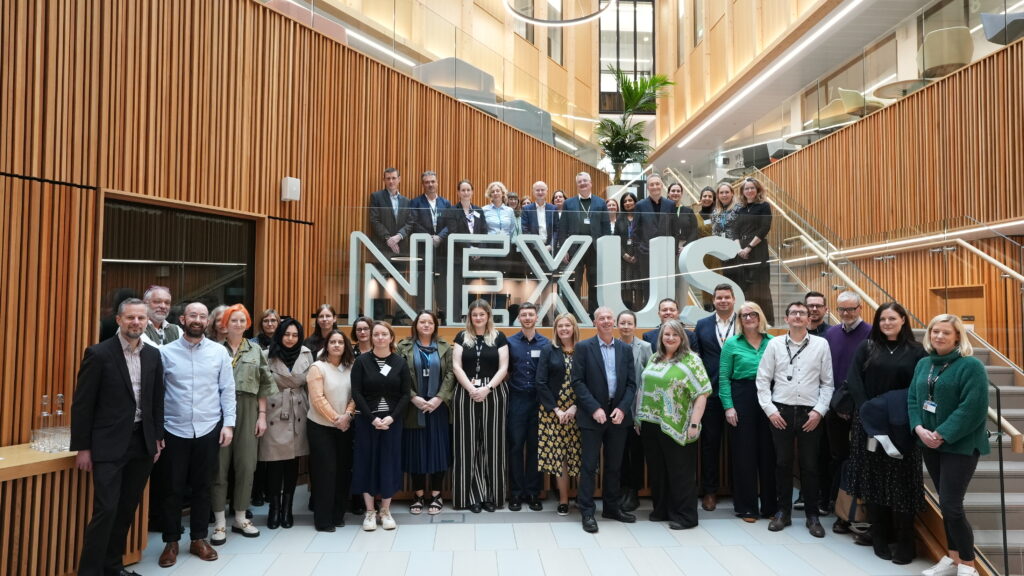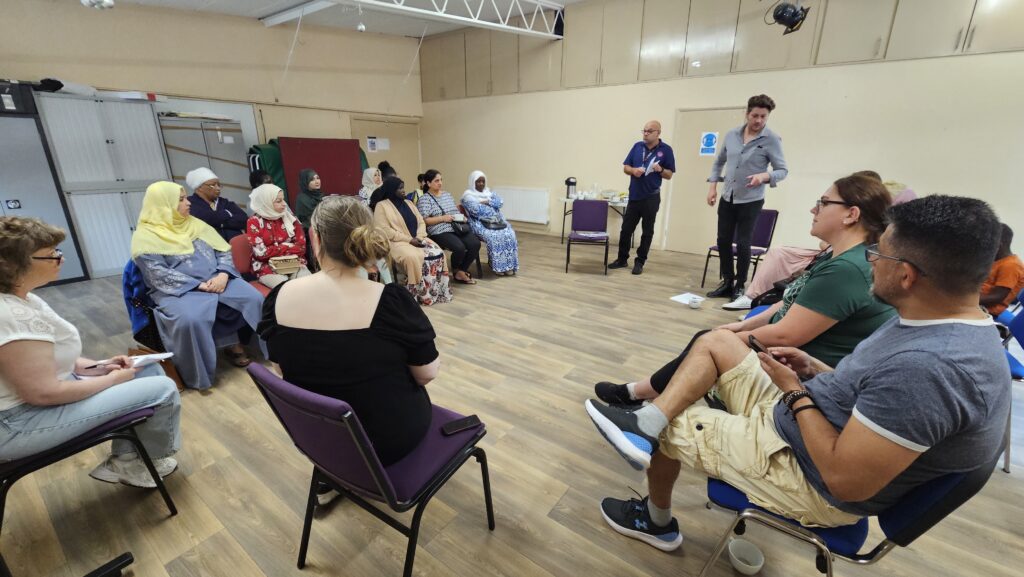At the heart of Leeds’ mission to become a healthier, fairer and more economically inclusive city lies a powerful engine of progress: the Leeds Anchor Network (LAN).
One of the first and most mature networks of its kind in the UK, this unique alliance of public, private and community organisations is committed to improving lives through good work, and economic growth that benefits everyone.
The LAN was formed in 2018 and brings together 14 of the city’s largest employers – including the council, NHS trusts, higher and further education, culture, and utilities.
Together, they focus on areas where they can make the biggest difference for local people, particularly in some of our city’s most deprived neighbourhoods.
A place-based partnership with purpose
Factors such as where people are born, grow, work, live, and age have been shown to account for up to 80% of health outcomes[1]. These are the social determinants of health, and Public Health England identifies income and employment as among the most important.[2]
One of the network’s most powerful levers is its scale. With 62,000 employees and 70,000 students across its member organisations, LAN has an outsized influence on the social determinants of health – in particular, employment.
Amy Beswick, Economic Policy Project Manager at Leeds City Council, explains:
“The Leeds Anchors Network is underpinned by the city’s wider ambitions to tackle poverty and inequality and improve life for everyone in Leeds.
These ambitions focus on four key areas of stronger communities, health and wellbeing, inclusive growth and a sustainable city.
“By bringing together a brilliant mix of diverse organisations, Leeds is working to ensure that, for everyone living, working, studying or visiting here, it really is the best city.” Amy explains.
“And for the Leeds Anchors, this integrated approach ensures our priorities – whether in inclusive employment or climate action – are not just policy aspirations, but collective commitments which translate into action.”
Ahead of the curve nationally with novel approaches
According to Amy, what sets the Leeds approach to health outcomes apart is the depth of relationships between organisations and their shared sense of place.
“Many cities only started forming anchor networks after COVID, but Leeds was ahead of the curve. That early start gave us time to mature our partnership, and it shows,”
The city’s ability to turn ambition into action through its standout Anchor Network has been celebrated in the Government’s recently published 10 Year Plan for Health.
The plan highlights the Leeds Health and Care Academy’s Connecting Communities with Health and Care Careers (CCHCC) programme, a geographically targeted programme that actively engages with and recruits from the most deprived wards of the city. The programme adopts a ‘flipped recruitment approach’ — a model that moves away from traditional recruitment methods to make health and care careers more accessible to the city’s 10% most deprived areas.
Harnessing deep and mature partnership working, the initiative was co-designed with communities across Leeds, and health and social care partners including many Leeds Anchor organisations.
The CCHCC is hosted within the academy’s ‘Talent Hub, a city-wide service that connects communities with health and care careers. Between 2024-2025, 1500 people engaged with the Talent Hub and 627 of those individuals resided within one of the cities priority wards.
Boasting an impressive >90% retention rate after 12 months and with almost three quarters of candidates from ethnically diverse backgrounds, the programme has not only opened up a talent pool for the health and care sector of the city, but has led to greater diversity in workforce demographics, backgrounds and expertise.
The Government points to the CCHCC as a model which can be replicated, supporting national objectives to recruit more healthcare staff from the communities they serve, build a more sustainable workforce and improve access to healthcare careers for disadvantaged communities.
Anchored in community need
The LAN plays a key role in delivering the Leeds’ Health and Wellbeing Strategy and priority initiatives as part of these plans.
A recent standout project is Good Jobs, Better Health, Fairer Futures, a significant citywide collaboration aimed at addressing inequalities in access to employment across the city, funded by the Health Foundation.
Here, community-led engagement, facilitated through the Leeds Community Anchor Network (LCAN) , a city-wide network of trusted third and faith sector organisations and supported by the Leeds Anchor Network, has begun to influence local practice, partnerships, and approaches to workforce inclusion.
Amy describes how the ‘Listening Exercise’ worked with residents in key areas of the city to identify a range of barriers to employment that they experience. These included digital exclusion, language barriers, lack of recognition for overseas qualifications, and recruitment processes which can feel impersonal and hard to navigate.
“The exercise also showed the level of resilience, skills, and ambitions of local people, who want to contribute meaningfully to their communities and the city more broadly.”
LCAN has secured further funding to grow the community listening exercise on a citywide level, and Amy reveals how initiatives such as this are embedding real and lasting change in Leeds:
“In New Wortley, the listening sessions directly led to a new pre-employment programme run from the local community centre.”
LAN members are testing further new approaches to local recruitment, especially for roles based in neighbourhoods with low employment. Leeds City Council, for instance, has drawn on models developed through the Health and Care Academy to pilot hyperlocal, face-to-face recruitment events.
“We’ve learned that in-person, one-stop sessions, where someone can apply and interview on the same day work really well. It’s more human, more inclusive, and overcomes digital barriers,” says Amy.
“That’s what LAN is about: not just top-down strategy, but community-driven solutions,”
Joint action for real world impact
Collaboration isn’t just a buzzword in Leeds, it’s structural.
Leaders from across the Anchors Network meet in person every quarter to build trust, share learning and drive joint action.
One highlight is Leeds Beckett University’s service-learning model, where students work on real community challenges while gaining skills. For example, speech and language therapy students help address NHS waiting lists, benefitting both learners and patients.
Using tools like the Anchor Progression Framework, members assess and strengthen their practices around employment, local procurement, and wellbeing.
Amy explains: “Across the network, self-assessment scores for employment practices remain strong, but we’re pushing ourselves to go further, especially as the labour market evolves. Anchors consistently employ proportionally more women and LGB individuals than city averages, and their workforces are becoming more diverse in ethnicity and disability.”
It’s this spirit of practical, place-based collaboration that led the Department of Health and Social Care (DHSC) to join the Anchors Network, the first government department to do so.
Part of the Leeds Health and Social Care Hub, DHSC’s involvement reflects national recognition of the power of place-based partnerships, and how Leeds is leading the way when it comes to addressing health and economic priorities in this way.
Data also shows the network’s real-world reach: 31% of Anchor employees based in Leeds live in the 20% most deprived neighbourhoods, indicating that the network is already embedded where it matters most.
Leeds means business
Good population health is essential for sustainable economic growth. And good work is fundamental to helping people to live healthier lives. Leeds Anchors is therefore increasingly working hand-in-hand with the private sector, partnering with companies who share the city’s ambitions to drive health and wealth for all.
Since launching in 2023, Leeds Business Anchors already includes 11 businesses who are supporting the city to tackle health inequalities, while building and sustaining an impressive local skills and talent pipeline.
As Anchors, businesses play an important role in contributing to inclusive economic growth by providing quality jobs, recruiting locally, developing skills, supporting communities, spending locally, and having a positive environmental contribution.
Global engineering consultants, Arup, have had a presence in Leeds since 1989, and has created 120 new jobs in Leeds since the start of 2021 – including 100 apprenticeships and graduate positions.
Niall Bourke, Associate Director at Arup reveals why Arup joined the Anchors Network, reflecting the company’s commitment to championing local employment and sustainability:
“Arup’s commitment to shaping a better world is grounded in our core value of being a socially useful organisation. In Leeds, we undertake local needs analysis to better understand the city and identify opportunities for delivering meaningful social value. The Leeds Anchors Network complements this approach by connecting us with other public and private sector organisations that share a commitment to local impact. The network also aligns with our corporate objectives by strengthening local connections and enabling more collaborative approaches to place-based outcomes. It has helped us build stronger relationships across the city, providing new routes for community engagement and creating space for shared learning. This shared ambition within the network has also helped foster a more coordinated approach to local impact.”
Home to four major universities and one of the UK’s largest further education colleges, Leeds’ strong talent pool includes 75,000 students, and the city has the largest number of STEM graduates outside London[3].
This unique skills pipeline helps industry thrive, and fuels one of the strongest regional economies outside London.
Last year, Arup moved over 500 employees, including 100 apprentices, into its new Leeds office and one of the UK’s most sustainable office buildings, 11 & 12 Wellington Place.
Niall explains why the city was the obvious choice as a location to grow a business focused on local impact and sustainability:
“Arup’s Leeds office is home to over 500 professionals working across the built environment, with growing capacity and expertise. Leeds benefits from a strong pipeline of talent, supported by local universities and training institutions, and attracts individuals with a wide range of skills and perspectives. Many of our people are also motivated to contribute beyond their project work. The Leeds Anchors Network provides a platform to support this civic engagement, and working with partners helps us channel our efforts where they can be most effective.”
Looking ahead: From network to movement
As the Anchors Network evolves, the ambition is not just to expand, but to make the anchor approach the norm across the city’s economy.
“Our next step is to build a broader movement. That means supporting smaller organisations to act like Anchors, even if they don’t have big HR or procurement teams,” says Amy.
This means embedding anchor principles into procurement supply chains, offering practical tools, and celebrating local businesses that commit to good work and health.
A city built for impact
With a population as diverse as its economy,140 languages spoken in schools and world-class education institutions, Leeds is well-placed to cultivate the healthy, inclusive workforce of the future.
As Amy notes: “We’re big enough to offer opportunities, but small enough to foster partnerships. That’s our superpower.”
For businesses, health innovators, and civic leaders alike, the Leeds Anchors Network offers a model of how to turn strategic ambition into tangible, place-based impact, one good job at a time.
To learn more about the Leeds Anchors Network and how it supports health and growth for all, visit the Inclusive Growth Leeds website.
[1] https://www.medicalnewstoday.com/articles/social-determinants-of-health
[2] https://www.gov.uk/government/publications/health-profile-for-england/chapter-6-social-determinants-of-health
[3] https://invest-leeds.co.uk/locate/talent-skills/
Stay up to date with more of the latest news and updates from Leeds’ internationally-renowned health innovation ecosystem by signing up to receive our ebulletin. Find our quick-to-complete subscribe form below ⬇️



